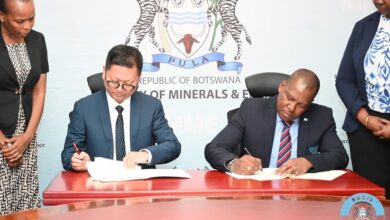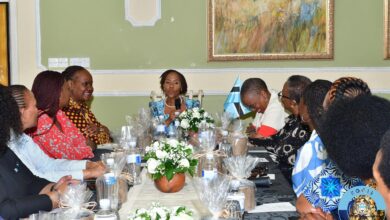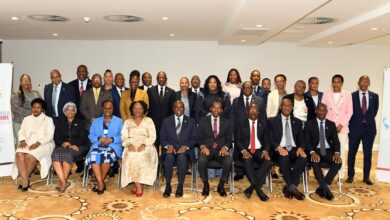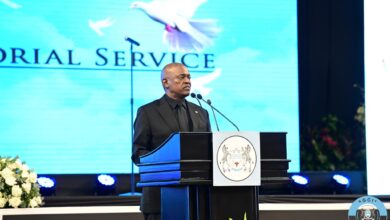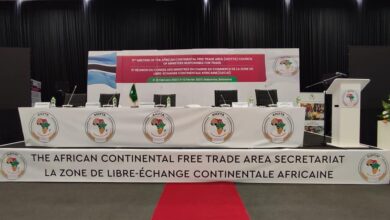News
𝗔𝗗𝗗𝗥𝗘𝗦𝗦 𝗕𝗬 𝗛𝗜𝗦 𝗘𝗫𝗖𝗘𝗟𝗟𝗘𝗡𝗖𝗬 𝗗𝗥. 𝗠𝗢𝗞𝗚𝗪𝗘𝗘𝗧𝗦𝗜 𝗘.𝗞. 𝗠𝗔𝗦𝗜𝗦𝗜 𝗣𝗥𝗘𝗦𝗜𝗗𝗘𝗡𝗧 𝗢𝗙 𝗧𝗛𝗘 𝗥𝗘𝗣𝗨𝗕𝗟𝗜𝗖 𝗢𝗙 𝗕𝗢𝗧𝗦𝗪𝗔𝗡𝗔 𝗢𝗡 𝗧𝗛𝗘 𝗢𝗖𝗖𝗔𝗦𝗜𝗢𝗡 𝗢𝗙 𝗧𝗛𝗘 𝗢𝗙𝗙𝗜𝗖𝗜𝗔𝗟 𝗢𝗣𝗘𝗡𝗜𝗡𝗚 𝗢𝗙 𝗧𝗛𝗘 𝟮𝟱𝗧𝗛 𝗖𝗢𝗡𝗙𝗘𝗥𝗘𝗡𝗖𝗘 𝗢𝗙 𝗧𝗛𝗘 𝗪𝗢𝗥𝗟𝗗 𝗢𝗥𝗚𝗔𝗡𝗜𝗦𝗔𝗧𝗜𝗢𝗡 𝗙𝗢𝗥 𝗔𝗡𝗜𝗠𝗔𝗟 𝗛𝗘𝗔𝗟𝗧𝗛 (𝗪𝗢𝗔𝗛) 𝗥𝗘𝗚𝗜𝗢𝗡𝗔𝗟 𝗖𝗢𝗠𝗠𝗜𝗦𝗦𝗜𝗢𝗡 𝗙𝗢𝗥 𝗔𝗙𝗥𝗜𝗖𝗔
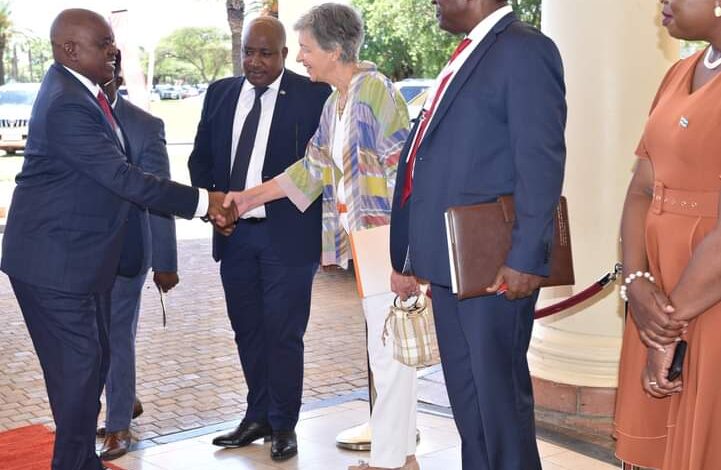
- It is truly a pleasure for me to welcome you to the Republic of Botswana on this occasion of the 25th Conference of the World Organisation for Animal Health (WOAH) Regional Commission for Africa. I want to preface my remarks by thanking WOAH for accepting our offer to host this important conference in Botswana. It is, indeed, an honour for our country to host an event of this magnitude and significance.
- Distinguished Ladies and Gentlemen, Trans-boundary Animal Diseases (TBDs), in particular, Foot and Mouth Disease (FMD), are a major obstacle to our region’s developmental agenda. FMD reverses the gains we make in the eradication of poverty amongst our people.
- The disease kills international trade in livestock and it is a major contributor to the continuing under-exploitation of this valuable resource in Africa. This, of course, contributes to marginalisation of our people as they do not participate in the high value global trade.
- For Botswana, FMD presents a special problem as the livelihoods of our people in rural areas depend on livestock and the periodic outbreaks of the disease in certain zones is highly disruptive to their lives.
- Distinguished Ladies and Gentlemen, in Botswana, the control of FMD dates back to the 1930’s when our forefathers in their wisdom, erected crude barriers made of tree trunks to intercept FMD outbreaks to protect parts of the country that were not affected. This was the beginning of the country’s regionalisation and zonation system which underpins our animal health system today.
- However, this zonation system comes with a significant maintenance cost of infrastructure especially cordon fences and quarantine camps. In our case, this is exacerbated by the fact that we have an overabundance of elephants which destroy cordon fences; thanks to our successful wildlife conservation policies, strategies and practices.
- Furthermore, the zonation does come with an environmental cost including interference with natural migratory movements of wildlife and gene flow between populations which affect genetic diversity.
- It is for this reason that in 2006 Botswana and other Southern Africa Development Community (SADC) member states established the Kavango–Zambezi Transfrontier Conservation Area (KAZA- TFCA) which is the second-largest of its kind in the world, spanning the international borders of five countries in Southern Africa.
- The goal of the KAZA-TFCA is to sustainably manage the Kavango Zambezi ecosystem including its heritages and cultural resources thorough harmonisation of policies, strategies and practices.
- Distinguished Ladies and Gentlemen, despite the successes made in the global effort to control major animal diseases, including the eradication of rinderpest, the apparent persistence of Trans-boundary Animal Diseases like FMD, Cattle lung disease (CBPP) and Goat plague (PPR) in our region is a cause for concern.
- Notwithstanding the advancement in technologies, and the availability of expertise as well as resources both regionally and internationally, the prevalence of Trans-boundary Animal Diseases in the region appears to be increasing.
- Distinguished Ladies and Gentlemen; the emergence of serotype “O” of FMD in the Southern Africa region is not just of academic interest, but it is also of great concern. Serotype “O” will not only bring complexity in the control of FMD, but it has cost and affordability implications. FMD vaccines are already expensive and, therefore, it is obvious that the inclusion of another serotype in the mix will drive the cost of vaccine production upwards.
- We are also observing with apprehension as Peste des petits ruminants (PPR) or goat plague spreads across the continent. Goats are the backbone of rural economies, especially in developing countries. In Botswana, we have prioritised the development of the small-stock (sheep and goats) sector because of its huge potential to support livelihoods and create employment.
- It is, therefore, important to carefully study the patterns of Trans-boundary diseases in order to come up with strategies that are underpinned by information sharing and regional collaboration. In this regard, it is crucial to have a club of like-minded players such as WOAH delegates and the relevant support institutions.
- I am very pleased to learn that WOAH Regional Commissions are established to address specific animal health problems facing member states in different regions, and to organise regional cooperation to control animal diseases.
- I, therefore, challenge this conference to come up with credible, practicable and pragmatic recommendations that can be converted into strategies for the Africa region national governments and economic communities such as SADC to implement.
- Botswana, like the rest of the international community, is worried about the emerging problem of Antimicrobial Resistance (AMR). The country has not been spared the horrendous effects of AMR. A clear example is the occurrence of multidrug resistant strains of tuberculosis.
- In this regard, the Government of Botswana is establishing a Public Health Institute (BPHI) which will coordinate public health emergencies and emerging health risks including zoonosis and AMR.
- Ladies and Gentlemen, a major driver of AMR is the systemic misuse of antimicrobials and lack of good quality medicines. It is important for us as a region to acknowledge that it as a huge problem so that we can begin to address it. For this reason, I am happy to note that the region has made a lot of progress in improving the governance of medicines including establishing National Regulatory Authorities (NRAs), harmonising registration to improve access to good quality medicines and monitoring antimicrobial use in animals.
- I am proud to inform you that Botswana has at last joined the list of African countries with an autonomous NRA, namely, Botswana Medicines Regulatory Authority (BOMRA). The Government of Botswana implements a monitoring programme for residues of veterinary medicines, pesticides and contaminants in animals, animal feed and animal products. This will soon be extended to other food commodities.
- We do not allow the use of Antibiotic Growth Promoters (AGP) in livestock nutrition as we believe that antibiotics are best preserved for serious conditions. Accordingly, we have banned the use of colistin in agriculture in recognition of its unique position as the last line of defence drug against multi resistant strains of pathogens.
- The Government of Botswana is taking advantage of WOAH’s support programs such as Performance of Veterinary Services (PVS) to continuously improve the nation’s veterinary services. Since the 2010 PVS evaluation, a fully functional veterinary statutory body (veterinary council) has been established to regulate the veterinary profession.
- The Botswana Vaccine Institute (BVI) has an experience of over 40 years in the manufacture of livestock vaccines. The Botswana Government prioritised Foot and Mouth Disease (FMD) vaccine to ensure protection of livestock of its citizens as well as those of neighbouring countries, especially in Southern Africa. To date, the SADC region relies on the provision of FMD vaccines and others from BVI. BVI exports over 90% of its production to over twenty countries across Africa.
- BVI’s Vision is to be a Global Centre of Excellence for infectious disease control in order to address the continued prevalence of infectious diseases that economically threaten livestock trade especially by African countries.
- As pests and diseases have become a burden to the world on account of their serious impacts on humans, plants and animals due to the ever-changing environmental factors, BVI is, therefore, a critical stakeholder in ensuring sustained efforts towards the One Health Concept.
- Director General, I want to thank you on behalf of the Africa continent, for the assistance WOAH continues to provide to member states. Programs like the Veterinary Legislation Support Program (VLSP) go a long way towards strengthening veterinary services through modernising legislation and aligning it with current and emerging health issues.
- In conclusion, I want to assure you of my Government’s continued support of WOAH in its mission to protect the health of animals and people. Botswana currently hosts the SADC Sub Region of Southern Africa (SADC SRR). This offer will continue for as long the WOAH needs it.
- Distinguished Ladies and Gentlemen, it is now my pleasure to declare officially opened the 25th Conference of WOAH Regional Conference for the Africa Commission. I wish you a productive conference and look forward to the outcomes of this momentous event. For those delegates who come from outside Botswana, please feel free to interact with Batswana to appreciate their warmth and generous hospitality.
I thank you.
PULA!

